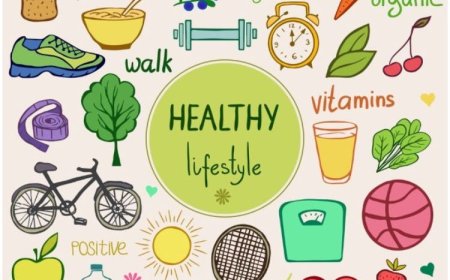5 health tips for World Health Day!
1. Eat Nutritious Food You’ve no doubt heard of the expression ‘you are what […] The post 5 health tips for World Health Day! appeared first on MyFitnessChat.

1. Eat Nutritious Food
You’ve no doubt heard of the expression ‘you are what you eat!’ Research suggests that what you eat can impact your risk of heart disease, stroke, and type 2 diabetes. Try to eat a variety of nutrient-rich foods, including fruit, vegetables, grains, protein-rich foods (such as seafood, lean meat, and eggs), and oils. A well-balanced diet provides all the energy you need to keep active throughout the day. Nutrients you need for growth and repair, helping you to stay strong and healthy and help to prevent diet-related illness. You can consume meat, milk, eggs, or fish for protein sources, and carbohydrates from rice, potatoes, oats, or whole wheat bread to give you energy. What you consume can also have a significant impact on mental wellbeing and focus. For example, studies[1] suggest that not having a healthy breakfast affects your mental performance, including your attention, ability to concentrate and memory. This can make some tasks feel harder than they normally would. Even eating a breakfast is much better than having none whatsoever. But it is still important to know some healthier alternatives like porridge with fruit, overnight oats, eggs, Greek yogurt, or something as simple as adding berries to your cereal. If you struggle with time management in the mornings, making a smoothie to take on your journey will fill you up and provide your body with energy.
2. Regular Exercise
Physical activity has a great, endless number of benefits for the human body and mind. Not only can exercise improve your health and reduce [2] the risk of developing several diseases, such as type 2 diabetes, cancer, and cardiovascular disease, but it can also really improve your mental health. It can change levels of chemicals in your brain, such as serotonin, increase the release of endorphins and reduce stress hormones. Physical exercise can effectively improve the working memory of older adults. It increases molecular targets like the brain-derived neurotrophic factor (BDNF). This molecular factor increases synaptogenesis, forming new synapses that mediate learning and memory, making it easier to absorb information and form long-term memories. Exercising regularly helps boost your immune system. This means you may get sick less often than people who do not exercise. When you exercise, your muscles convert stored energy into heat energy, causing your body to warm up. Similarly, if you are someone who has trouble sleeping or staying asleep, then working out is your answer. Exercise helps to clear your head and helps you feel relaxed.
3. Drink More Water 
Drinking plenty of water is so important to stay hydrated, especially when exercising because it regulates body temperature and carries oxygen for steady breathing. [3] Research also shows that dehydration may increase risks of anxiety and depression, so its extra important that on rough days, you are drinking lots of water to maintain your mental wellbeing.
4. Manage Sleeping
Believe it or not, your sleep routine starts before you get into bed, so it’s important to build in time every evening to wind down – and try to switch off from your tech. Things like reading, gentle stretches or meditation are an effective way to unwind. Having caffeine, alcohol or nicotine or a big meal too close to bedtime can prevent you from sleep, as these things may make your brain more alert. If you lie awake worrying, set aside time to make a to-do list for the next day – this can put your mind at rest. Exercise during the day will make your body tired and in need to rest, therefore resulting in a better night sleep.
5. Sufficient Vitamin Needs

Vitamins have different jobs to help keep the body working properly. Some vitamins help you resist infections and keep your nerves healthy, which you can all get from certain foods. But how can you tell if your body isn’t getting enough, and you need to take them? Symptoms such as fatigue, lack of energy, weakness, and dizziness are all symptoms of vitamin and micronutrient deficiencies. Vitamin D comes from being in the sunlight for at least 15 minutes a day, however, the reality is, 60% of people in the UK have insufficient levels. Vitamin D helps our bodies absorb calcium, which is important for bone health and strength. Not getting enough can increase likelihood of being sick, bone and back pain, and hair loss. [4] Magnesium calms our nervous system and reduces stress after 90 days, which can be beneficial for mental health and stress issues. If you are someone who struggles with balancing blood sugar levels or easing your sleep, you could consider increasing magnesium intake. However, a lot of people are magnesium deficient because they aren’t eating the right foods, not because they need supplements. Try eating more pumpkin, spinach, beans, tofu, brown rice, or nuts before jumping to supplements for solutions.
The post 5 health tips for World Health Day! appeared first on MyFitnessChat.
What's Your Reaction?


























































































